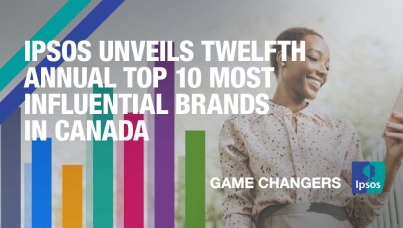The Internet Is Changing The Way In Which Teens Socialize In Canada
Vancouver, BC -- In a recent Ipsos-Reid survey of 1,226 online teenagers between 12 and 17 in Canada, socializing supersedes all other online activities by a wide margin, suggesting that the Internet is changing the social fabric of interpersonal communication among teens. Ipsos-Reid's Canadian Inter@ctive Reid Report took a detailed look at the online activities of teens 12-17 years of age and examined how they were using the Internet for things such as downloading music, education, shopping, playing games, and to get in touch with others. Based on a list of 18 online activities asked, sending and receiving email (73% do so at least a few times per week) and using instant messaging (70%) far exceed the list of other non-social online activities participated in by a significant margin. Furthermore, there are a host of other social activities such as playing online games against friends (28%) or strangers (23%), posting to online forums (11%) or visiting web logs or "blogs" (10%), that a small, but dedicated group of online teens regularly participates in.
Participation in other non-social online activities such as doing research for school projects (45% do at least a few times per week), downloading music (29%), visiting news and information sites (23%), looking for movie reviews/show times (15%), uploading photos (15%), or listening to online radio (12%) are still popular, but far less common. On the other hand, other widely participated in adult online activities (by at least 189 of adults) don't even register among teens, such as comparison-shopping (9%), clicking online advertising (6%), online banking (2%), and ecommerce (1%).
In fact, so prevalent has email and instant messaging become, that it is a daily activity among 57% of teens, and a weekly activity among nearly all teens (97%). In comparison, only 50% of adults have even tried instant messaging, and daily usage of email is just 57%. Older teens are much more likely to use instant messaging and email than younger teens, as 59% of 15-17 year olds use email daily compared to 189 that number among 12-14 year olds (30%), and the same applies for instant messaging (60% daily vs 36% among younger teens).
"We're really seeing a fundamental shift in communication behaviours amongst teens across the country" says Steve Mossop, Senior Vice President of Ipsos-Reid. "The amount of time teens are spending online interacting with each other through chatting, gaming and posting to forums etc., has significantly changed the face of teen social interactions in just a decade. Rather than picking up the phone, teens have turned to the keyboard as the preferred communications device for this generation".
Although 88% of online teens still claim to use the home telephone as a means of communicating with their friends, when asked which is their favourite way of talking to their friends, the home phone and instant messaging are virtually tied, at 45% and 44% respectively. Email and cell phones are almost off the radar screen as the preferred method as only 6% of teens pick email as their favourite way to communicate with friends and only 4% pick their personal cell phone.
However, among older teens (15-17 years of age) instant messaging takes the top spot in terms of preferences, with 50% picking it compared to 37% picking the home phone (53% of teens 12 to 14 pick the home phone compared to 41% who pick instant messaging).
There is also a potentially alarming trend developing across the nation as 14% of teens have ever been asked to meet in person with someone they originally met online, a percentage that increases to 20% among those between 15 and 17 years of age.
"Much to the alarm of parents of teens, this does raise a potential red-flag ", says Mossop. "However, I believe it's the nature of random, extreme cases of meetings gone wrong that has parents concerned rather than in-person encounters being a widespread legitimate threat" Mossop suggests.
Steve will be speaking at an upcoming BC Chapter of the American Marketing Association event in Vancouver on December 1st, 2004 to discuss how this, and other findings from our Inter@ctive Teens Report has changed the way in which marketers need to respond in order to reach teens in an online world. To find out more about this event or to register, please go to www.bcama.com.
The Canadian Inter@ctive Reid Report is the largest, most comprehensive, and authoritative source of its kind about quarterly Internet trends in Canada. The results are based on 1,226 online Interviews with teen Web users from Ipsos-Reid's Canadian Internet Panel. Panelists are chosen through random telephone surveys conducted on an ongoing basis across Canada. Interviews were completed between October 7 and October 12, 2004. These data are statistically weighted to reflect the population proportions of regular online users by online expertise and regional distribution. Our panelists represent approximately 14.4 million Canadian adult Internet users who are online for one hour a week or more (there are a total of 17.9 million adults who have Internet access).
With a national sample of 1,226 teens, one can say with 95% certainty that the overall results are within a maximum of 1772.8 percentage points of what they would have been had the entire population of Canada's online teens been surveyed. The margin of error will be larger for sub-groupings of the survey population.
For more information on this news release, please contact:
Steve Mossop
Senior Vice President
Ipsos Reid
(604) 257-3200
[email protected]
Ipsos-Reid
Ipsos-Reid is Canada's market intelligence leader and the country's leading provider of public opinion research. With operations in eight cities, Ipsos-Reid employs more than 300 researcher professionals and support staff in Canada. The company has the biggest network of telephone call centres in Canada, as well as the largest pre-recruited household and on-line panels. Ipsos-Reid's Canadian marketing research and public affairs practices are staffed with seasoned research consultants with extensive industry-specific backgrounds, offering the premier suite of research vehicles in Canada--including the Ipsos Trend Report, the leading source of public opinion in the country--all of which provide clients with actionable and relevant information. Ipsos-Reid is an Ipsos company, a leading global survey-based market research group.
To learn more, visit: www.ipsos.ca
Ipsos
Ipsos is a leading global survey-based market research company, owned and managed by research professionals. Ipsos helps interpret, simulate, and anticipate the needs and reactions of consumers, customers, and citizens around the world.
Member companies assess market potential and interpret market trends. They develop and build brands. They help clients build long-term relationships with their customers. They test advertising and study audience responses to various media. They measure public opinion around the globe.
Ipsos member companies offer expertise in advertising, customer loyalty, marketing, media, and public affairs research, as well as forecasting and modeling and consulting. Ipsos has a full line of custom, syndicated, omnibus, panel, and online research products and services, guided by industry experts and bolstered by advanced analytics and methodologies. The company was founded in 1975 and has been publicly traded since 1999. In 2003, Ipsos generated global revenues of $644.2 million U.S.
Visit www.ipsos.com to learn more about Ipsos offerings and capabilities.



